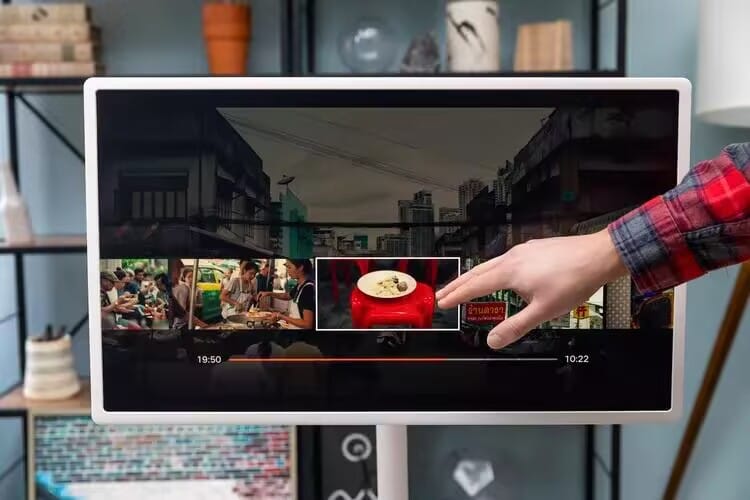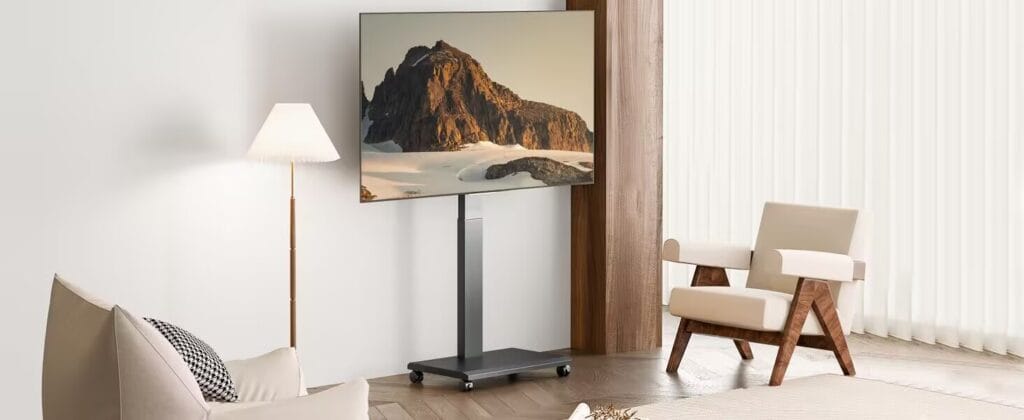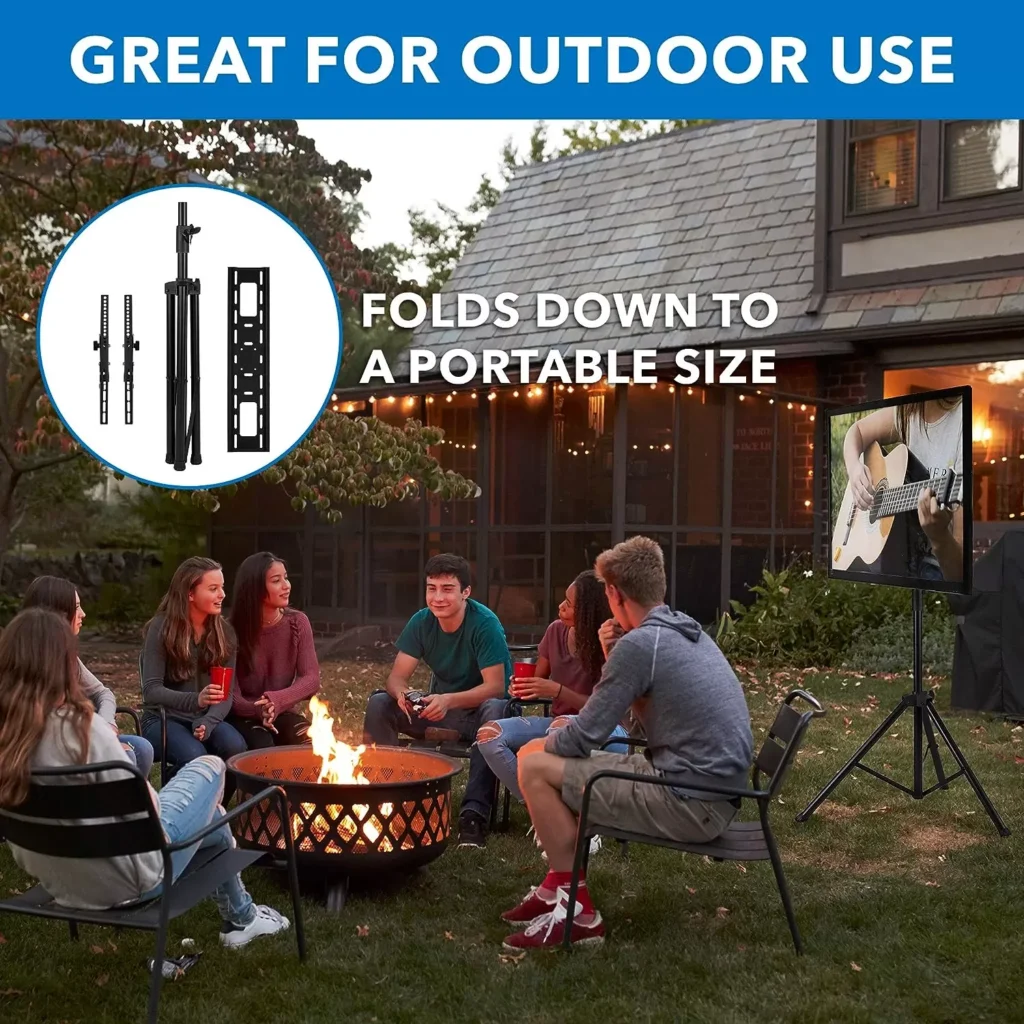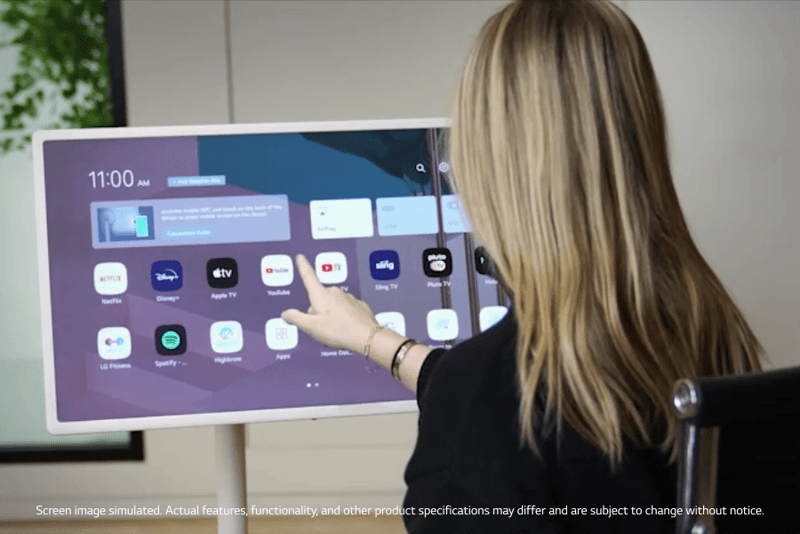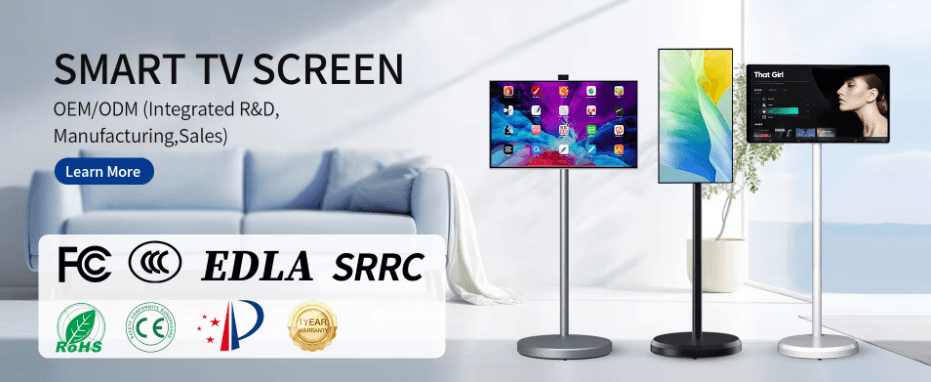When it comes to choosing the right TV for your home, office, or entertainment setup, you may be faced with the choice between a portable TV on wheels and a traditional fixed TV. While both serve the essential purpose of providing entertainment and media access, each offers unique benefits depending on your needs.
we’ll explore the key differences between portable TVs on wheels and fixed TVs, helping you determine which option is better suited for your lifestyle or work environment.
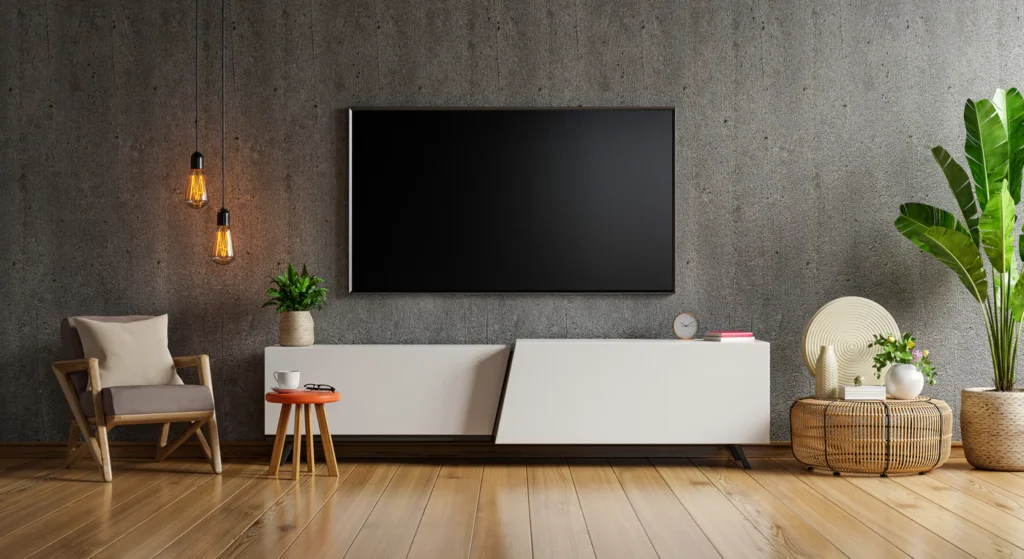
1. Mobility and Flexibility
Portable TV on Wheels:
The most significant advantage of a portable TV on wheels is, unsurprisingly, its mobility. These TVs are designed to be moved easily between rooms or locations, thanks to their sturdy wheels and adjustable stands. Whether you’re hosting a meeting in different rooms, rearranging your living space, or enjoying a movie outdoors, a portable TV on wheels offers the flexibility to move your entertainment wherever you go.
This mobility also makes it ideal for events, trade shows, classrooms, and even outdoor gatherings. You can quickly adjust the height or position, ensuring everyone gets a perfect view without having to move heavy furniture or install new mounts.
Fixed TV:
A fixed TV, on the other hand, is permanently mounted on a wall or placed on a stationary stand. While this setup is ideal for a single room with a dedicated entertainment area, it lacks the flexibility that a portable TV on wheels offers. Moving a fixed TV requires uninstalling it, which can be a cumbersome and time-consuming process.
For people who only need a TV in one room and don’t plan on moving it frequently, a fixed TV may be a suitable choice. However, for those who want more versatility, a portable TV on wheels offers clear advantages.
2. Installation and Setup
Portable TV on Wheels:
One of the best features of a portable TV on wheels is its minimal setup. Most models require little to no installation; simply place the TV on the stand, and you’re ready to roll. This ease of use makes it an ideal option for those who aren’t comfortable with complicated setups or those who rent homes and prefer not to drill holes into walls.
Because it’s portable, there’s no need to worry about cable management or making sure it’s level on the wall. You can move the TV freely, adjust its height, and position it without any hassle. For people who like to frequently rearrange their space, this feature is invaluable.
Fixed TV:
A fixed TV typically requires professional installation, especially if it’s mounted on the wall. You’ll need to ensure that the TV is securely mounted, properly aligned, and that all wires are concealed. While this setup offers a clean, sleek look, it can be costly and time-consuming.
If you decide to move the TV to another room, you’ll need to go through the entire installation process again. Additionally, fixed TVs are less forgiving in terms of adjusting the height or angle of the screen.
3. Space-Saving and Aesthetic Appeal
Portable TV on Wheels:
Portable TVs on wheels are typically more compact and don’t require a large entertainment unit. This makes them ideal for smaller spaces or environments where you don’t want to commit to a fixed installation. You can easily move the TV out of sight when it’s not in use, saving valuable space in your home or office.
Aesthetically, portable TVs offer a more functional, versatile look, especially in modern or minimalist spaces. Since the wheels and stand are often sleek and unobtrusive, they blend well with a variety of interior designs.
Fixed TV:
A fixed TV can create a more polished and professional look, particularly when wall-mounted. It’s a great option if you’re looking for a permanent entertainment center that doesn’t take up floor space. Many people prefer fixed TVs because they can be seamlessly integrated into the design of the room, especially when paired with built-in speakers or entertainment consoles.
However, fixed TVs can be limiting in smaller spaces where you might want to rearrange the layout or repurpose the room. Unlike portable TVs, they remain stationary, which can restrict how you use the space around them.
4. Durability and Stability
Portable TV on Wheels:
Portable TVs are designed for frequent movement, meaning they’re built to be durable. The stands often come with locking mechanisms on the wheels to ensure that the TV stays securely in place during use. Modern portable TVs are designed to handle movement without compromising the stability of the screen.
However, if you have small children or pets, there’s always a slight risk of the TV being knocked over if it’s not securely locked. For added safety, many portable TV stands come with options to attach the stand to the wall when needed.
Fixed TV:
Fixed TVs are typically more stable since they’re either wall-mounted or placed on heavy, sturdy stands. Once installed, they’re not going anywhere, which can be an advantage if you live in a busy household with children or pets. The risk of accidental damage is much lower with a fixed TV setup.
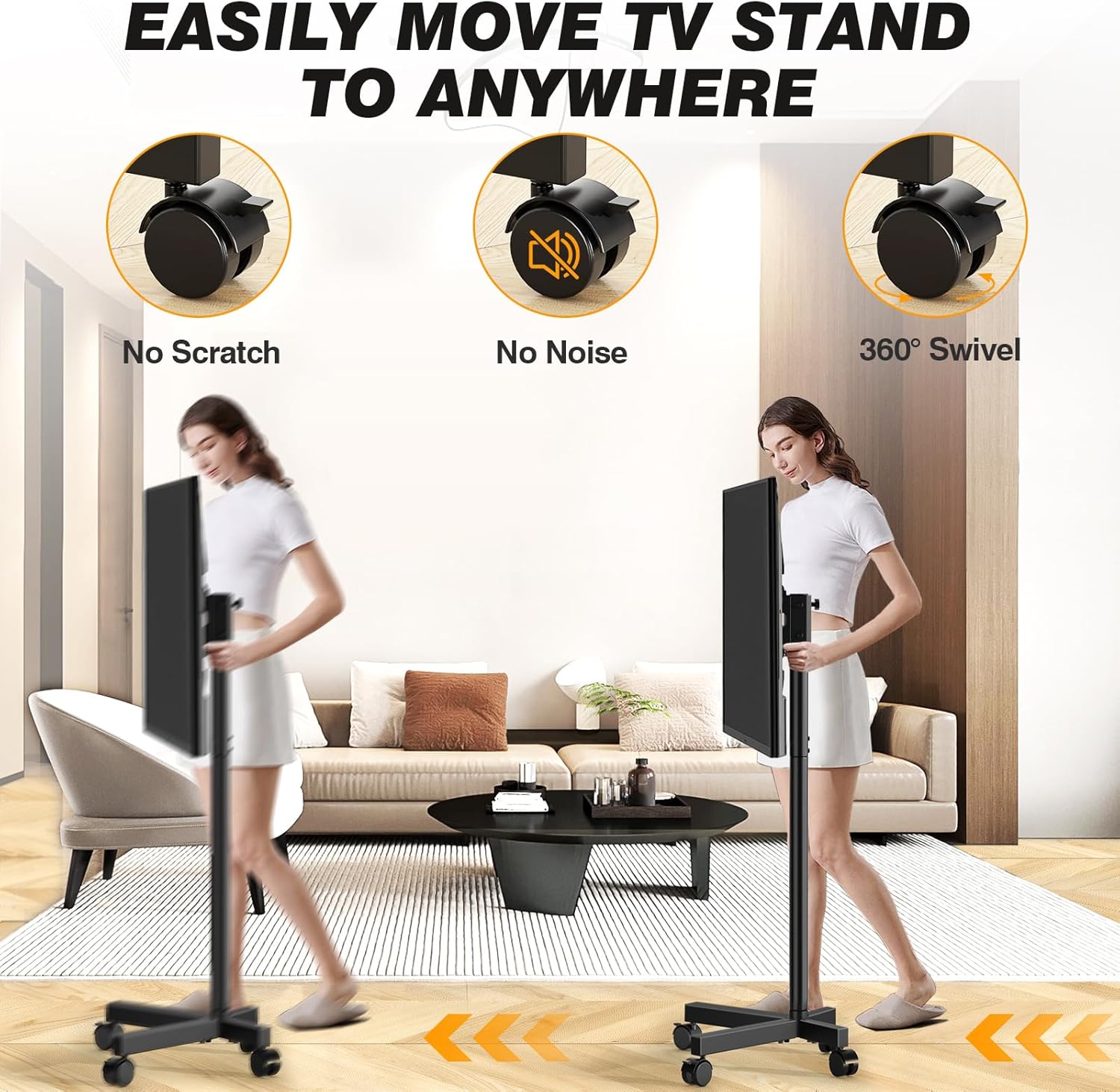
5. Cost Considerations
Portable TV on Wheels:
While the price of a portable TV on wheels can vary depending on the size and features, they generally offer excellent value for money due to their versatility. You’re essentially getting two devices in one: a high-quality TV and a mobile entertainment center. For those who frequently move between rooms or need a TV that can serve multiple functions, this is a cost-effective solution.
Fixed TV:
Fixed TVs often come with additional installation costs, especially if you’re hiring professionals to mount them. While the upfront cost might be comparable to a portable TV on wheels, the lack of flexibility can make it a less attractive investment if your needs change over time.
6. Best for Specific Use Cases
Portable TV on Wheels:
Portable TVs on wheels are perfect for people who need flexibility and mobility. They’re ideal for classrooms, business meetings, trade shows, and homes with multi-use spaces. They can be easily transported from one location to another, making them the best choice for those who want more freedom in how and where they use their TV.
Fixed TV:
Fixed TVs are great for dedicated home theaters or living rooms where the TV will remain in one spot for most of its use. If you have a room specifically designed for entertainment or want a more polished, permanent setup, a fixed TV is a great option.
Conclusion: Which is Better?
Choosing between a portable TV on wheels and a fixed TV depends on your specific needs. If you value mobility, flexibility, and the ability to move your entertainment system around, a portable TV on wheels is the better choice. It provides a level of convenience that a fixed TV simply can’t match.
At Onext, we offer high-quality portable TVs on wheels designed to meet the needs of modern users. Our TVs are lightweight, durable, and equipped with multiple connectivity options, ensuring that you can enjoy entertainment wherever you go. To explore our range of portable TV solutions, visit us at Onext Portable Monitors.
Onext related product recommendations
-
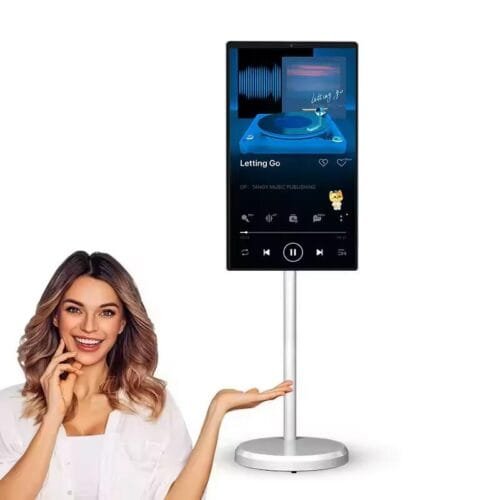 27-Inch Portable Tv Monitor On Wheels Touch Screen 1080p 64GB Storage Smart Screen,Portable Monitor Rotating Display With Mobile Base,With Built-in Battery ,Smart Monitor with Type-C Port
27-Inch Portable Tv Monitor On Wheels Touch Screen 1080p 64GB Storage Smart Screen,Portable Monitor Rotating Display With Mobile Base,With Built-in Battery ,Smart Monitor with Type-C Port -
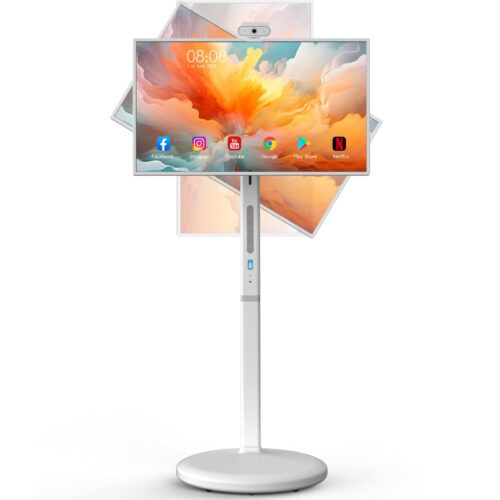 Portable Smart TV 32″ 1080P Touch Screen Monitor on Wheels, Android OS 13 Built-in Battery, Detachable Camera and Stand, Full Swivel Rotation Rolling Tablet for Kitchen, Bedroom, Outdoors
Portable Smart TV 32″ 1080P Touch Screen Monitor on Wheels, Android OS 13 Built-in Battery, Detachable Camera and Stand, Full Swivel Rotation Rolling Tablet for Kitchen, Bedroom, Outdoors -
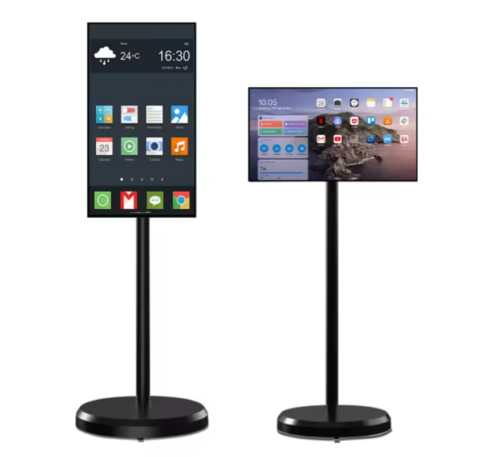 Stand by Me TV 21.5-Inch 1080P Portable TV on Wheels Touch Screen Monitor, Built in Battery, Full Swivel Rotation, Android12, 60Hz Refresh Rate
Stand by Me TV 21.5-Inch 1080P Portable TV on Wheels Touch Screen Monitor, Built in Battery, Full Swivel Rotation, Android12, 60Hz Refresh Rate
